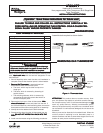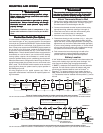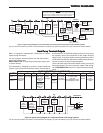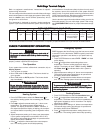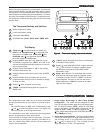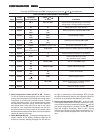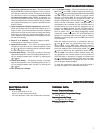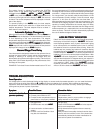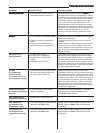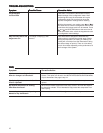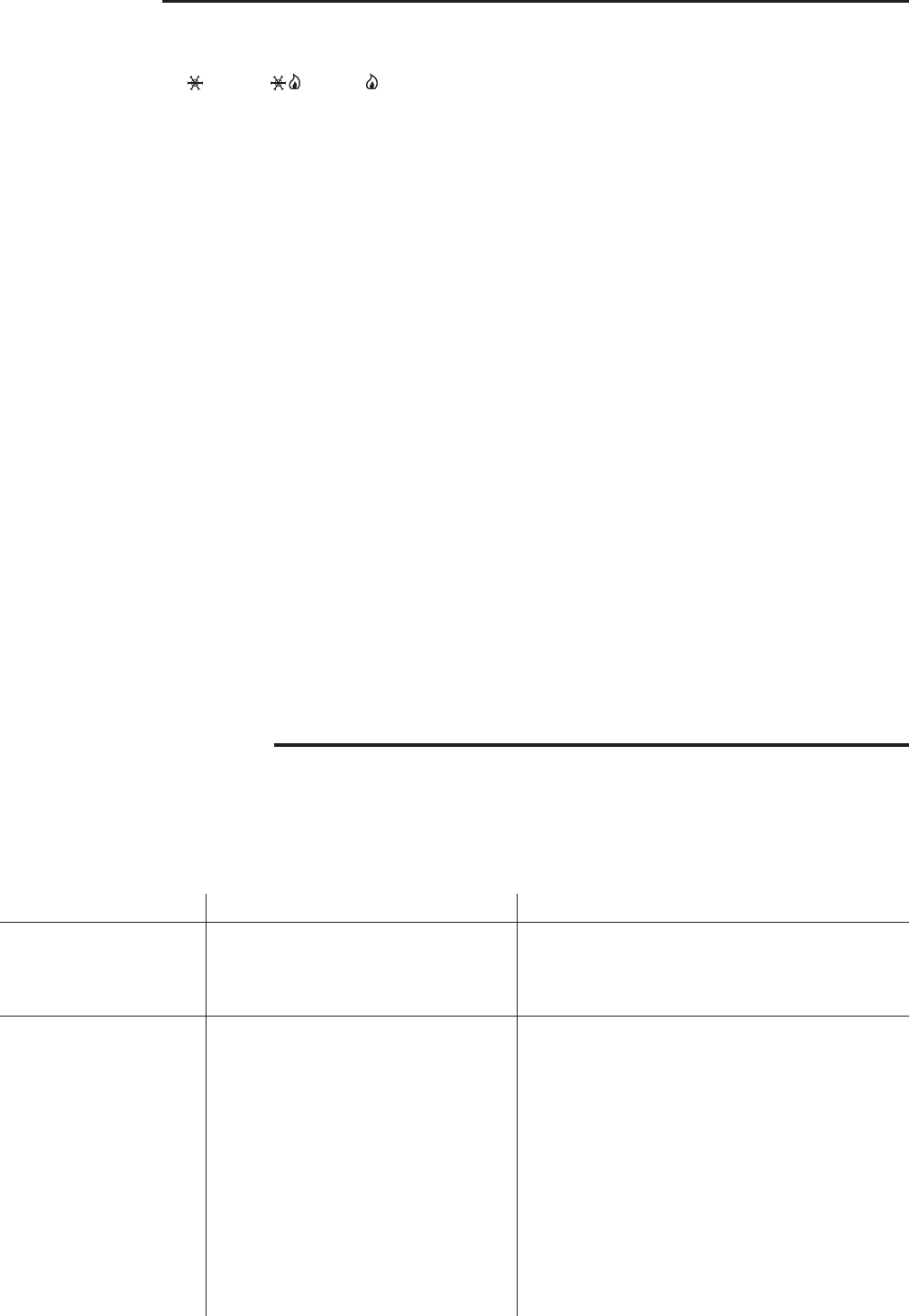
OPERAOPERA
OPERAOPERA
OPERA
TIONTION
TIONTION
TION
The system "mode" is selected by pressing the SYSTEM
button. Icons on the bottom right corner of the display will
indicate the mode:
COOL COOL
COOL COOL
COOL (
),
AUTO AUTO
AUTO AUTO
AUTO ( ),
HEAT HEAT
HEAT HEAT
HEAT ( ),
EMEREMER
EMEREMER
EMER,
or
OFFOFF
OFFOFF
OFF. In any mode except
OFFOFF
OFFOFF
OFF, the setpoint temperature will
be shown on the right side of the display. In
OFFOFF
OFFOFF
OFF, this area will
be blank. The current temperature will be displayed on the left
side of the display.
To operate properly in the
AUTO AUTO
AUTO AUTO
AUTO mode, the heat setpoint
temperature cannot be the same as or higher than the cool
setpoint temperature. The heat setpoint must be at least 1°
lower than the cool setpoint.
Automatic System ChangeoverAutomatic System Changeover
Automatic System ChangeoverAutomatic System Changeover
Automatic System Changeover
When the thermostat is in the
AUTO AUTO
AUTO AUTO
AUTO mode, both the
Flame Flame
Flame Flame
Flame and
Snowflake Snowflake
Snowflake Snowflake
Snowflake icons are displayed. The thermostat will call for heat
or cool depending on the room temperature. The setpoint
temperature displayed will be that of the last mode called. If the
last system cycle was heat, the
HEAT HEAT
HEAT HEAT
HEAT setpoint will be displayed.
If the room temperature raises above the
HEAT HEAT
HEAT HEAT
HEAT setpoint and the
COOL COOL
COOL COOL
COOL setpoint and a call for cool is required, the temperature
displayed will change to be the
COOL COOL
COOL COOL
COOL setpoint.
Second Stage Time DelaySecond Stage Time Delay
Second Stage Time DelaySecond Stage Time Delay
Second Stage Time Delay
Your thermostat is designed to determine the optimum time to
activate the second stage. Simply raising the temperature in
heating or lowering it in cooling will not always force the
thermostat to bring the second stage on quickly. There is a time
delay from 0-30 minutes depending on the performance of the
first stage of the system.
EXAMPLE: For the last 2 hours the thermostat is set on 70° and
the room temperature is 70° with the equipment using only the
first stage of heat. Since the equipment is keeping the tempera-
ture within 1° of setpoint, the thermostat will delay second stage
for a longer time if you manually raise the temperature or if the
room temperature quickly changes. Once the second stage
comes on, it will come on sooner the next time there is a
difference between the setpoint and the room temperature. The
net effect of the staging program is that when the first stage is
capable of making temperature the second stage will delay
longer. When the thermostat calculates that first stage cannot
make temperature in a reasonable time, the second stage will
come on sooner. This built in function automatically optimizes
the use of additional stages of heat or cool.
LOW BATTERY INDICATORLOW BATTERY INDICATOR
LOW BATTERY INDICATORLOW BATTERY INDICATOR
LOW BATTERY INDICATOR
If the 2 “AA” alkaline batteries are low and should be replaced,
the display will be blank except for “
LO BATTLO BATT
LO BATTLO BATT
LO BATT”. We recom-
mend replacing batteries every 2 years. If the home is going
to be unoccupied for an extended period (over 3 months),
the batteries should be replaced before leaving. When the
batteries are low, pressing any button will cause the display
to operated for ten seconds. After ten seconds, the display will
be blank except for “
LO BATTLO BATT
LO BATTLO BATT
LO BATT”. You cannot program with low
batteries, but you can override setpoint temperature. After
“
LO BATTLO BATT
LO BATTLO BATT
LO BATT” has been displayed for 4 weeks, the thermostat
will raise the temperature 10 degrees above your setpoint in
COOL mode and will drop the temperature 10 degrees below
your setpoint in HEAT mode. If the “
LO BATTLO BATT
LO BATTLO BATT
LO BATT” condition
continues, and when it reaches certain value, the thermostat
will turn off all the loads and “
LO BATTLO BATT
LO BATTLO BATT
LO BATT” will flash.
Corrective ActionCorrective Action
Corrective ActionCorrective Action
Corrective Action
Replace fuse or reset breaker.
Turn switch to ON.
Replace door panel in proper position to engage
safety interlock or door switch.
Re-light pilot.
Press SYSTEM button to
HEATHEAT
HEATHEAT
HEAT and raise setpoint
above room temperature.
Verify thermostat and system wires are securely
attached.
Many furnaces have safety devices that shut down
when a lock-out condition occurs. If the heat works
intermittently contact the furnace manufacturer or
local service person for assistance.
TRTR
TRTR
TR
OUBLESHOOOUBLESHOO
OUBLESHOOOUBLESHOO
OUBLESHOO
TINGTING
TINGTING
TING
Reset OperationReset Operation
Reset OperationReset Operation
Reset Operation
If a voltage spike or static discharge blanks out the display or causes erratic thermostat operation, you can reset the thermo-
stat by removing the wires from terminals
RR
RR
R and
CC
CC
C and removing batteries for 2 minutes. After resetting the thermostat,
replace the wires and batteries. If the thermostat has been reset and still does not function correctly, contact your heating/
cooling service person or place of purchase.
SymptomSymptom
SymptomSymptom
Symptom
No Heat/No Cool/No FanNo Heat/No Cool/No Fan
No Heat/No Cool/No FanNo Heat/No Cool/No Fan
No Heat/No Cool/No Fan
(common problems)(common problems)
(common problems)(common problems)
(common problems)
No HeatNo Heat
No HeatNo Heat
No Heat
Possible CausePossible Cause
Possible CausePossible Cause
Possible Cause
1. Blown fuse or tripped circuit breaker.
2. Furnace power switch to OFF.
3. Furnace blower compartment door or
panel loose or not properly installed.
1. Pilot light not lit.
2. SYSTEM button not set to
HEATHEAT
HEATHEAT
HEAT.
3. Loose connection to thermostat or
system.
4. Furnace Lock-Out Condition. Heat
may also be intermittent.



